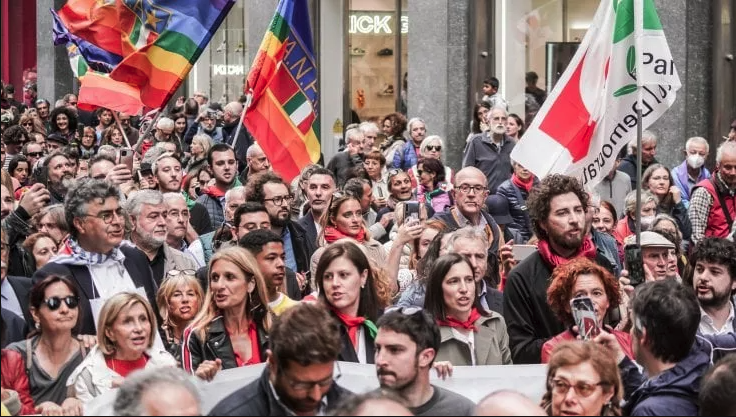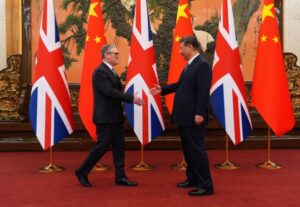
Published 26/04/2023 18:54 | Edited 4/26/2023 7:35 PM
On the day Italy celebrates the 78th anniversary of its liberation from Nazi-fascism, far-right prime minister Giorgia Meloni and her supporters are criticized for dubiousness over the date when the whole country marches against fascism. In the city of Milan, more than 100,000 people took to the streets to “honor the Resistance”. Just like in Portugal, April 25, 1974 is an anti-fascist celebration, in Italy, where Benito Mussolini’s regime originated, April 25, 1945 celebrates the liberation of Italians from Nazi-fascist control.
It is customary for the date to bring together Italians, with parades and ceremonies of authorities, but for the first time since the Second World War, the country is led by a party with roots in neo-fascism, a movement that emerged after the overthrow of the regime of Benito Mussolini. His party, Brothers of Italy, is a direct political descendant of the Italian Social Movement, formed by members of Mussolini’s Fascist Party after the end of the war.
In demonstrations across the Italian metropolises, the tone was critical of the prime minister, with opposition leaders occupying the platforms and megaphones. But far-right government leaders also attended, despite boos.
The mayor of Milan, Giuseppe Sala, stressed that the Italian prime minister “must put her face on and say clearly and definitively: ‘we are anti-fascists’” and stressed that her city “is profoundly anti-fascist”.
“Yesterday against Mussolini’s fascism, today against Meloni’s neo-fascism”, says the text of one of the posters, which reveals a photomontage of the prime minister wearing the clothes of the Duce, Benito Mussolini.
As a young man, Meloni told French TV: “I think Mussolini was a good politician. Everything he did, he did for Italy. And we haven’t had a politician like that in the last 50 years.”
The reports highlighted the contrast between Meloni’s agenda and that of President Sergio Mattarella. Unlike the prime minister’s ambiguities, he was emphatic in defending democracy and attacking anti-fascism. He also guaranteed appearances in the most emblematic locations of the resistance and fight against Mussolini.
fascist presence
But other controversial characters also attended. A banner with the inscription “no one is deceived and can forget the blood shed in order not to betray” and the symbol of the fascists, songs, threats and fascist salutes. Intrusion by neo-Nazis from Do.ra. (Militant Community of the Twelve Rays) during the April 25 celebration in Azzate, in the province of Varese.
The head of the group, the criminal Alessandro Limido, faced an anti-fascist demonstrator, creating tensions, amidst the astonishment and fear of families and children present at Azzate park for Liberation Day. The police and the mayor of the municipality prevented the situation from getting worse.
Another controversy occurred when a group of young people flying Ukrainian flags were expelled from demonstrations in Rome, Turin and Bologna. The Ukrainian resistance is often associated with neo-Nazism by sectors of the left. There were protests from politicians against this attitude.
+Europa party secretary, Riccardo Magi, was one of them. “Yesterday we saw violence and aggression from those who today believe they are defending Liberation: let’s go ahead and believe that freedom and democracy are also defended against those who think they are anti-fascist but deep down they are not”.
Card of Meloni
Italian Prime Minister Giorgia Meloni said right-wing parliamentary parties “declared their incompatibility with any nostalgia for fascism” and that the freedom party was a “moment of national harmony”.
Meloni’s statements were made in a letter published this Tuesday (25) by the daily “Corriere della Sera”, on the day that the party of the “liberation from Nazi-fascism” is celebrated. In an editorial, La Republicca criticizes the Prime Minister’s letter:
“But even if everything had really already been said, why does law oppose this judgment and continually fall back into the vice of provocation, falsification, ambiguity, with the men it has brought to the top of institutions? It is this instrumental and misleading reading of history that prevents the word ‘anti-fascism’ from being pronounced and prevents the national harmony sought by the Premier. If the ambiguity about the nature of the Republic is not eliminated, the calendar will remain an obstacle for the right.”
Meloni wrote this letter after controversial statements by some members of his party, Brothers of Italy, such as the President of the Senate, Ignazio La Russa, a famous collector of fascist antiquities, who declared that the Italian Constitution was not “anti-fascist”. His house appears on TV full of busts of Mussolini.
Democratic Party leader Elly Schlein declared that “anti-fascism is our constitution”. Calls for the senator’s resignation rained down. Meloni nodded to the opposition in his text, silencing about La Russa: “Democracy and freedom are engraved in the Constitution with a text that aimed to unite, not divide: we need to make this anniversary a moment of renewed harmony”.
While Meloni tries to convey an image of moderation to the rest of Europe, he fails to keep his supporters in line. Last week, Agriculture Minister Francesco Lollobrigida – one of his closest allies, and his brother-in-law – was accused of advocating white supremacy for saying Italians were at risk of “ethnic substitution” due to immigration. Gianfranco Fini, another neo-fascist deputy, also said on TV that “there is no more reluctance about the word anti-fascism”.
The association of Italian guerrillas (ANPI), those who fought against the Nazi occupation and fascism, called this Monday for the Government to publicly declare its “anti-fascism”.
On her first April 25 as prime minister, Meloni hopes that her reflections published in the newspaper “will contribute to making this anniversary a moment of rediscovery of national harmony”, where the celebration of the new freedom will help them “to understand and strengthen the Italy’s role in the world as an indispensable bulwark of democracy”.
“Since the 25th of April [de 1945], a democracy was born in Italy in which no one would be willing to give up the freedoms conquered. That is, freedom and democracy are everyone’s heritage, whether those who wanted it or those who didn’t. And this is not only the greatest achievement that our nation can be proud of, but the only true antidote against any authoritarian risk”, writes Meloni.
The prime minister adds that “the fundamental result of the 25th of April was, and undoubtedly continues to be, the affirmation of democratic values, which fascism had trampled underfoot, and which we find inscribed in the republican Constitution”.
Fascist revisionism
However, most of Meloni’s ministers were distributed in places considered symbols of the Resistance in the country. In Palermo, April 25 was also an occasion for a tribute to anti-mafia heroes, with Italian Interior Minister Matteo Piantedose calling for “the liberation of a territory from the mafia”.
In Rome, the Minister of Made in Italy, Adolfo Urso, celebrated the liberation at Porta San Paolo together with the Jewish Brigade. “April 25 is the holiday when“ everyone recognizes himself, like us, in the values of the Constitution, ”he said.
For his part, the Minister of Infrastructure, Matteo Salvini, paid tribute to the Americans killed in the cemetery in Florence, while the Minister of Civil Protection and the Sea, Nello Musumeci, laid a wreath at the memorial to those killed in Catania. Communists (partisans) and Soviets were the main protagonists of the liberation of Europe against Hitler and Mussolini.
In Pescara, the Minister of Family, Eugenia Roccella, reiterated that “there are no more divisions on anti-fascism”. Even Italy’s Minister of Education, Giuseppe Valditara, paid homage to those fallen for freedom in his hometown of Milan, where he laid wreaths at sites symbolic of the Resistance.
He was even the target of a small protest by a student network group. In addition, other demonstrations were held in Genoa, where boos, shouts and banners rained down against the mayor of the city, Marco Bucci, and the governor of the Liguria region, Giovanni Toti, during the act in Piazza Matteotti.
The Minister of Culture, Gennaro Sangiuliano, had his memo leaked to the press criticizing the holiday of most of his general directors in the middle of the long weekend of April 25th. He was surprised that no one had scheduled Liberation Day cultural events.
Meloni and his right-wing coalition have suffered setbacks in popularity polls. It is falling below 30% in preference, while the gap for the Democratic Party is now just 7%. Still, its anti-immigration positions have support in several regions of the country, although it does not present adequate answers to Italy’s economic problems.
Source: vermelho.org.br

